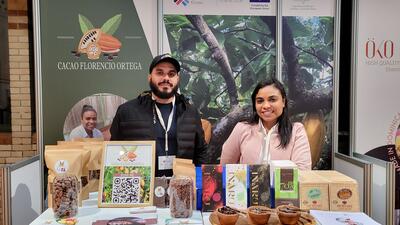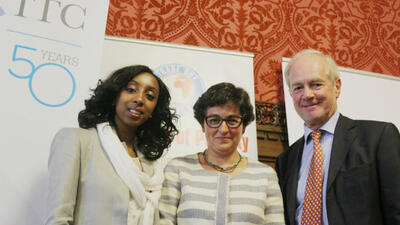Samoa se une a la OMC, la asistencia del ITC fue reconocida (en)
Samoa’s accession to the WTO is a key step towards accelerating the Pacific nation’s economic growth and increasing the prosperity of its people, Samoan officials said as the WTO accepted its 156th member in Geneva earlier today. WTO Director-General Pascal Lamy has thanked ITC for the assistance it provided during the country’s accession negotiations and in preparation for membership.
Joining the WTO, however, is just the first step: the country needs to take advantage of the newly found market access, Deputy Prime Minister Prime Minister H.E. Mr. Fonotoe Lauofo said earlier this week
Assistance provided during the WTO accession process is only one element in ITC’s portfolio to help Least Developed Countries integrate into the world trade system. “ITC’s approach provides assistance to SMEs, so that they can exploit the market access opportunities offered by WTO membership,” said ITC Executive Director Ms. Patricia Francis.
“It is important to move the country forward to align with everyone else,” said Mr. Muagututagata Peter Ahhim, Samoa’s Associate Minister for Commerce, Industry and Labour. “After 13 years of deliberations we are finally here.” The country has come a long way since the time of tariff levels above 60% in the 1990s, he said. As the first step towards joining the world trade system, the country has lowered tariffs to around 10% today. A key result of the WTO accession negotiations is that this level will not need to be further reduced immediately, said Nella Tavita-Levy, who has coordinated Samoa’s accession talks during the last ten years.
While the country has enjoyed preferential tariff levels at its main trading partners, it was to lose these unilateral concessions when graduating from LDC status in 2014. By joining the WTO it will retain this preferential treatment. “There will be a level playing field,” Ms. Tavita-Levy said. “We will no longer be dependent on unilateral concessions.”
WTO membership will automatically ensure most favoured nation status among the organization’s 155 members, including markets that have been virtually closed to Samoa until now. “They will be able to diversify and become less dependent on their current trading partners,” said ITC’s Jean-Sébastien Roure, who led the organization’s assistance to Samoa during its accession process.
ITC has assisted Samoa in preparation for membership by facilitating a dialogue between the private sector and government negotiators ensuring that the interests of the private sector are taken into account during the accession process. “There has been apprehension among some in the business community on how membership [in the WTO] will impact Samoan businesses, whether they can compete,” said Mr. Sili Epa Tuioti, a board member of the Samoa Chamber of Commerce. ITC’s support has been instrumental in alleviating these fears, in allowing the business community to learn from the experience of other LDCs that have joined the WTO and in finding a voice for the business community to influence the government’s negotiating position, he said. The impact of ITC’s support reaches far beyond accession, he added, as now the communication channels between the business community and those responsible for trade policy in government have been established. “It is good that we have invested resources in strengthening this dialogue,” he said. The government now routinely “comes to the private sector to seek its views on policy,” he added.
Reaping the benefits of membership
ITC’s involvement does not end with Samoa’s WTO accession. Instead, the emphasis will now shift to identifying ways in which Samoa can benefit from WTO membership. “We need to find the niches in which we are most competitive,” Tuioti said. “The opportunities are not in the mass market, but among niche, value added products,” he added, citing organic agriculture as an example.
ITC assisted Samoa in the preparation of a Fruits and Vegetables Sector Development Strategy in order to identify market segments with the highest export potential. It has also worked with small and medium size enterprises in the agro-processing sector to increase their export capacities by the establishment of ISO food safety management systems, a key requirement at many export markets. The projects were financed by the European Union.
Membership in the WTO also carries a symbolic value, as it will raise the country’s profile and help its tourism sector, said Oli Ah Mih, a board member of the country’s Hotel Association and the owner of a 70-room hotel in the capital Apia. As an importer, he also welcomed the pressure that the WTO put on the government in the 1990s to lower import tariffs before commencing negotiations. “The government used to look upon tariffs as a tool for revenue generation,” he said. “This has changed.”
Following the accession of Samoa and Vanuatu this year, there are still ten LDCs in the Accession process: Afghanistan, Bhutan, Comoros, Equatorial Guinea, Ethiopia, Lao PDR, Liberia, Sudan, Sao Tome and Principe and Yemen. The WTO’s General Council has recognized ITC’s contribution to the Accession process. The highest number of countries outside the Multilateral Trading System remain LDCs.
Samoa, in the meantime, is going to work hard to make the most of its membership, the Deputy Prime Minister said. The country is not going to sit on the sidelines but is looking forward to actively participate in discussions at the WTO, Mr. Lauofo told fellow ministers from LDCs on Thursday. “After having negotiated membership for 13 years, the obvious question is how the long coveted membership in this rule‐based system will serve our needs,” he said.






